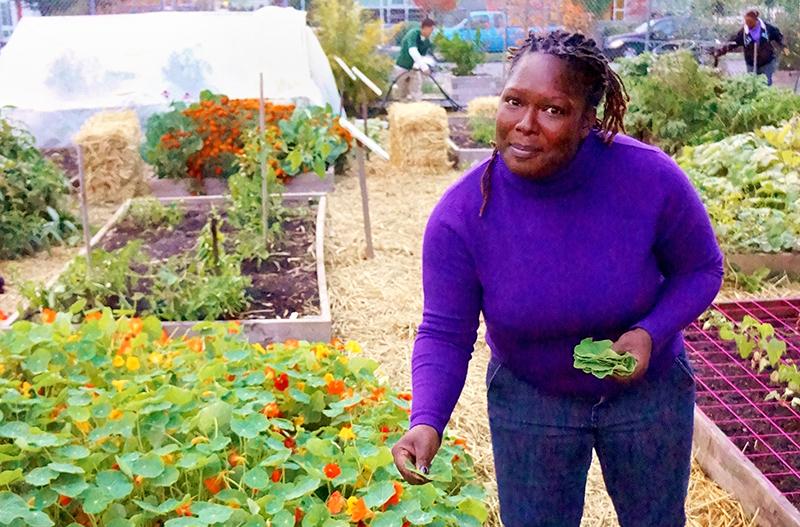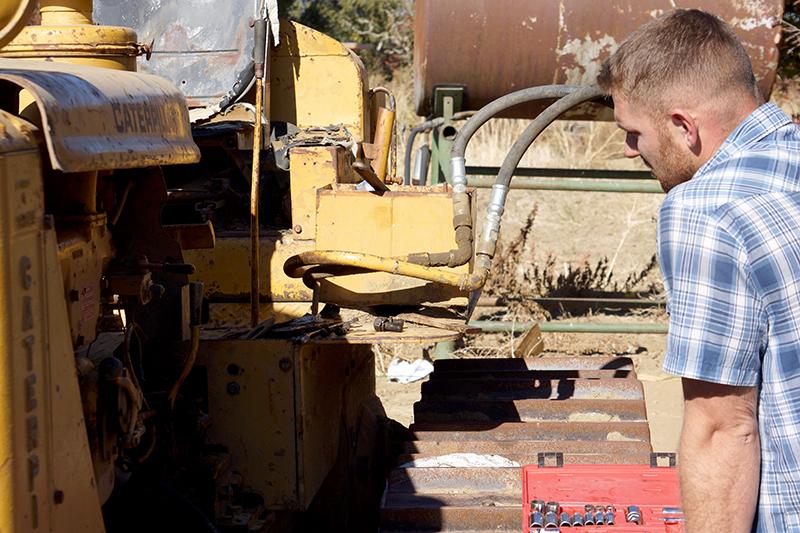After they return home, veterans miss out on employment opportunities due to stigmas about mental illness.
The Coalition of the Tilling: Veterans Fight Back on Home Ground
November 14, 2013
Eight years ago, Kelly Carlisle was working her station onboard the USS Essex, in the waters off the coast of Sasebo, Japan.
As an Operations Specialist, she kept a watchful eye on her radar screen to detect and track potential threats to her ship.
Since returning home and finishing her time in the navy, Carlisle has found new ways to apply her training. In her new area of operations, the biggest battles are part of the biological war she wages against the aphids and snails that threaten her plot.
With her time guiding a U.S. warship through foreign waters behind her, now her greatest enemies are the mice that creep through the planter boxes, eating her crops under the cover of darkness.
“When you’re in the military there’s a lot of focus on the enemy, whoever that might be, but when you’re on a farm, your only enemies are the pests, or the mice that eat up your strawberries,” she says.
On Veterans Day, Carlisle visits her favorite place to unwind, her “church,” the community farm she runs in East Oakland, on the corner of E Street and 83rd. In the afternoon, she waters her crops and picks ripe raspberries with the children in Acta Non Verba, a grassroots youth development program she founded in 2010.
Carlisle loves her farm, but her motivation is to share that passion with the children in her neighborhood. At Acta Non Verba, she works with children aged 5 to 13, who plan, plant, harvest, and sell the produce, and 100 percent of the proceeds go into savings accounts for the children.
“We’re really trying to access the kids before they lose their sense of wonder and surprise at things growing,” says Carlisle.
Previously ranked among the most dangerous cities in America, Oakland is not the first place you would expect to see a community farm.
In certain parts of the city, little has changed in the past decade. In the neighboring community, high school dropout rates have been almost 40 percent, Carlisle said. Fed up with all the talking, Carlisle’s approach is more hands-on.
“Acta Non Verba is Latin for ‘deeds not words,’ that’s our mantra, that’s what we believe in,” she says.
The farm’s benefits reach far beyond the children. James Gary is a retired gardener who lives nearby and visits the farm whenever he can. Since the first crops were planted, Gary has seen the park transformed from a trouble spot into a social hub.
Gary has lived in the community for 30 years, he said, and he was ready to leave. “There was nothing worth staying for,” he said.
“But then the garden came and I just forgot about it. Somebody asked me: ‘Man weren’t you going to move?’ I said I just forgot.”
Carlisle says there are parallels between the healing of a traumatized urban community and the healing of veterans, who may suffer from post-traumatic stress disorder.
“There are studies that show that many people living in low-income urban environments suffer from PTSD from violence and brutality, so a part of what we’re doing here is to address the PTSD of the community, and I think that parallels with what a lot of veterans are getting out of their farms.”
Once despondent about the future of his community, James Gary has seen this healing process firsthand.
“We should meditate rather than medicate. That’s something that we need to be introduced to as a community. Because, the people here need it man, they really do.”
Acta Non Verba survives on grants and community support, but the farm has also received assistance from the Farmer-Veteran Coalition, a not-for-profit organization based in Davis that helps veterans find their feet in the agriculture industry.
FVC pairs job-seeking veterans with eager farmers, and also provides education, resources, and grants for veterans looking to start their own farming operations. Now a nationwide operation, FVC has been helping veterans in California since 2008.

and brutality.
Ross Erickson, in charge of farm support and resource development at FVC, explains: “It’s a huge industry, with everything that has to do with agriculture: food, farming, ranching, and livestock. Even sales, distribution, whatever it is, we try to give them resources to help them succeed.
“A lot of guys call us up and say they have an opening on their farm or ranch, and we get a job description and put it on the website and get it to the vets in our network,” said Erickson.
Having served as a sergeant in the Marine Corps, deploying to Iraq and several postings in the Asia-Pacific, Erickson believes veterans have unique mental skills and leadership qualities, and employers who recognize this are setting themselves up to reap the rewards.
“A real high percentage of the U.S. military comes from rural communities, and so they come from that background and they want to get back out there and get back into a job where they can quantify what they’ve achieved,” said Erickson.
Erickson’s statement is backed by statistics from the Department of Labor, who reports 45 percent of armed service personnel originate in rural America.
On Veterans Day, America paused to give thanks to its veterans, past and present, and remember those who paid the ultimate sacrifice in defense of their nation.
America’s youngest veterans, the 2 million men and women who fought in Afghanistan and Iraq, face a range of social issues as they return to their civilian lives.
Gaining employment, and with it a sense of purpose, can go a long way to ease their reintegration, but, because of the misconception that veterans are damaged, ticking time bombs, many employers are hesitant to hire them.
According The Institute for Veterans and Military Families at Syracuse University, data for September from the Bureau of Labor shows that post 9/11 veterans aged between 20 and 24 are 81 percent more likely to be unemployed than civilians of the same age.
Interestingly, the rate of veteran unemployment for this age group more than halved in October, but post 9/11 veterans of all ages are still 47 percent more likely to experience unemployment.
Carlisle agrees that veterans have specialized training and life skills that should make them more employable in the workplace, but because of the stigma of mental illness, they are being underemployed.
“In the navy our mantra is ‘Honor, Courage, and Commitment,’ most veterans embody that,” said Carlisle. “That’s something that employers should want, they should really value those strengths in their prospective employees. Veterans are some of the most highly trained, most responsible employees that anyone could hire.”
It is often said that a soldier does not fight because he hates what is in front of him, but because he loves what is behind him. Now more than ever, America’s veterans need their communities to return this favor.

